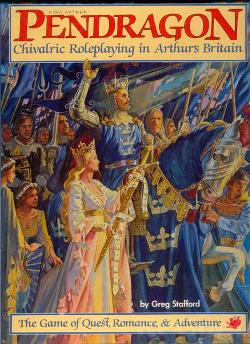Pendragon (role-playing game)
| Chivalric Roleplaying in Arthur's Britain | |
|---|---|

Pendragon 1st edition box cover, 1985.
Illustration by Jody Lee. |
|
| Designer(s) | Greg Stafford |
| Publisher(s) | Chaosium, Green Knight Publishing, White Wolf, Inc., Nocturnal Media (since 2004) |
| Publication date | 1985 (1st edition) 2nd edition never released 1990 (3rd edition) 1993 (4th edition) 1999 (reprinted 4th edition) 2000 (The Book of Knights) 2005 (5th edition hardcover) 2008 (5th edition softcover reprint) 2010 (5.1th edition) 2016 (5.2th edition) |
| Genre(s) | Historical, Fantasy |
| System(s) | Basic Role-Playing variant |
Pendragon, or King Arthur Pendragon, is a role-playing game (RPG) in which players take the role of knights performing chivalric deeds in the tradition of Arthurian legend. It was originally written by Greg Stafford and published by Chaosium, then was acquired by Green Knight Publishing, who in turn passed on the rights to White Wolf Publishing in 2004. White Wolf sold the game to Stewart Wieck in 2009. Wieck formed Nocturnal Media, which has since updated and reissued the 5th edition originally published by White Wolf.
In 1991, Pendragon (3rd edition) won the Origins Award for Best Roleplaying Rules of 1990. In 1999 Pyramid magazine named Pendragon as one of The Millennium's Most Underrated Games. Editor Scott Haring said "Pendragon is one of the few RPGs that has a moral point of view ... And it's a great melding of game system with game world.". The 5th edition won the Outie award for Best Retread in 2006.
Like several other RPGs from Chaosium (most notably Call of Cthulhu), Pendragon has a literary basis, in this case the fifteenth-century Arthurian romance, Le Morte d'Arthur, and it studiously avoids fantasy RPG cliches in favor of its source material. This has caused it to become something of a cult game, even within the narrow confines of the RPG market.
Adventures are often political, military, or spiritual in nature, rather than dungeon crawls, and are often presented as taking place congruently with events from Arthurian legend. An important part of the game is the time between adventures, during which player characters manage their estates, get married, age, and have children. Typically, the characters will have one adventure per year, and campaigns often carry over across generations, with players retiring their character and taking the role of that character's heir. This is quite different from most role-playing games, where one set of characters is played fairly intensively, and there is typically little consideration made of what happens to their family or descendants. The influence of this idea can be seen in the Ars Magica RPG, which also encourages stories taking years or decades to unfold (and which is also set in medieval Europe).
...
Wikipedia
